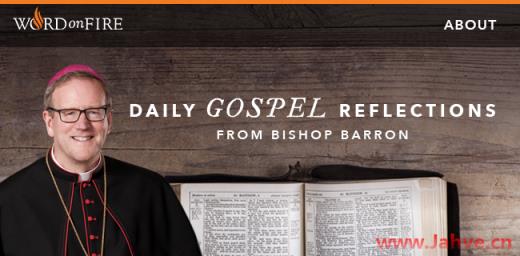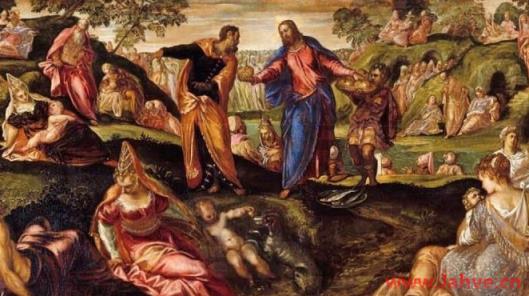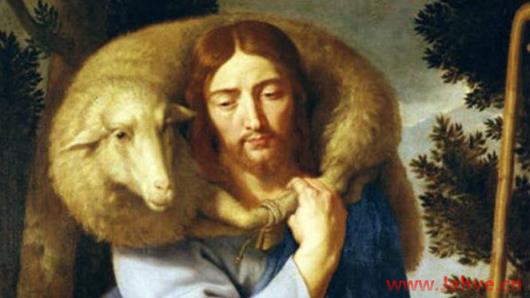 Bishop Barron翻译|Carrie2018-4-21
Bishop Barron翻译|Carrie2018-4-21 朋友们,今天我们读到《若望福音》非凡的第六章结尾部分。祂跟众人说:“你们若不吃人子的肉,不喝他的血,在你们内,便没有生命。”福音中说“耶稣的门徒中有许多人…说:‘这话生硬,谁能听得下去呢?’”耶稣知道他们的窃窃私议,便说:“这话使你们起反感吗?”如果耶稣的说话只是象征性的,那么听众就不会有这种激烈的震惊情绪。耶稣绝对可以把自己的话归于象征意义,但祂没有这么做。主说完这些话之后发生的事情是《新约》中最令人伤心的时刻之一:福音说祂的大多数门徒都背弃了祂。但当耶稣问十二门徒是不是也要离开的时候,伯多禄作为代表回答:“主!惟你有永生的话。我们去投奔谁呢?我们相信,而且已知道你是天主的圣者。”古往今来,教会一直与伯多禄并肩作证。耶稣不是众多的有趣教师之一;唯独祂一个有着永生的话——祂确确实实是天主的圣者,而且祂通过圣餐的血肉来到我们面前。Friends, we come today to the end of the extraordinary sixth chapter of John’s Gospel. He has told his listeners, "Unless you gnaw on the flesh of the Son of Man and drink his blood, you have no life in you."We hear that "many of Jesus’ disciples…said, ‘This saying is hard; who can accept it?’" Knowing their murmuring, Jesus says, "Does this shock you?" Now, if his words were meant in a symbolic sense, they wouldn’t have had this explosive, shocking effect on his listeners. Given every opportunity to clarify his meaning along symbolic lines, Jesus does nothing of the kind.What follows from these words of the Lord is one of the saddest moments in the New Testament: the Scripture tells us that most of his followers abandoned him.But when Jesus asks whether his disciples will leave, too, Peter speaks for the Twelve: "Master, to whom shall we go? You have the words of eternal life. We have come to believe and are convinced that you are the Holy One of God."The Church, down through the ages to the present day, has stood with Peter. Jesus is not one interesting teacher among many; he is the only one, the one with the words of eternal life—indeed, he is the Holy One of God. And he comes to us through the flesh and blood of the Eucharist.2018-4-22
朋友们,今天我们读到《若望福音》非凡的第六章结尾部分。祂跟众人说:“你们若不吃人子的肉,不喝他的血,在你们内,便没有生命。”福音中说“耶稣的门徒中有许多人…说:‘这话生硬,谁能听得下去呢?’”耶稣知道他们的窃窃私议,便说:“这话使你们起反感吗?”如果耶稣的说话只是象征性的,那么听众就不会有这种激烈的震惊情绪。耶稣绝对可以把自己的话归于象征意义,但祂没有这么做。主说完这些话之后发生的事情是《新约》中最令人伤心的时刻之一:福音说祂的大多数门徒都背弃了祂。但当耶稣问十二门徒是不是也要离开的时候,伯多禄作为代表回答:“主!惟你有永生的话。我们去投奔谁呢?我们相信,而且已知道你是天主的圣者。”古往今来,教会一直与伯多禄并肩作证。耶稣不是众多的有趣教师之一;唯独祂一个有着永生的话——祂确确实实是天主的圣者,而且祂通过圣餐的血肉来到我们面前。Friends, we come today to the end of the extraordinary sixth chapter of John’s Gospel. He has told his listeners, "Unless you gnaw on the flesh of the Son of Man and drink his blood, you have no life in you."We hear that "many of Jesus’ disciples…said, ‘This saying is hard; who can accept it?’" Knowing their murmuring, Jesus says, "Does this shock you?" Now, if his words were meant in a symbolic sense, they wouldn’t have had this explosive, shocking effect on his listeners. Given every opportunity to clarify his meaning along symbolic lines, Jesus does nothing of the kind.What follows from these words of the Lord is one of the saddest moments in the New Testament: the Scripture tells us that most of his followers abandoned him.But when Jesus asks whether his disciples will leave, too, Peter speaks for the Twelve: "Master, to whom shall we go? You have the words of eternal life. We have come to believe and are convinced that you are the Holy One of God."The Church, down through the ages to the present day, has stood with Peter. Jesus is not one interesting teacher among many; he is the only one, the one with the words of eternal life—indeed, he is the Holy One of God. And he comes to us through the flesh and blood of the Eucharist.2018-4-22 朋友们,天主是牧人在《圣经》中是个经典意象。在《厄则克耳》先知书中,我们读到天主将在某天到来亲自牧养以色列。牧人守卫、领导、保护、照看羊群——正如天主守卫、领导、保护、照看以色列。当耶稣说:“我是善牧”时,这个意象达到了最高境界。善牧的定义是什么?就是为羊群奉献生命。善牧完全为他人着想、尽心尽力、甘于献出自己的生命来换取羊群的安全。当然,一位善牧应该竭尽所能来保护和领导自己的追随者,但我们之中有谁会真的指望祂为追随者而死?但耶稣声称自己要做的正是如此。想想人类和羊之间的差别;然后无限地倍增这种差别,你就可以想象天主与人类之间的差别。然而,天主却甘愿为我们这样的人付出生命。Friends, the image of God as shepherd is a classic one in the Bible. In the book of the prophet Ezekiel, we hear that God would one day come and shepherd Israel himself. Shepherds guarded, guided, protected, and watched over their flocks—just as God guards, guides, protects, and watches over Israel.This image comes to a climactic expression in the words of Jesus: "I am the good shepherd." What precisely makes him good? A good shepherd lays down his life for the sheep. The good shepherd is so other-oriented, so devoted to his sheep, that he is willing to surrender his life that they might live.Sure, a good shepherd should do all that he can to protect and guide his flock, but who among us would really expect him to give his life for them? But this is precisely what Jesus claims to do.Imagine the difference between humans and sheep; now, multiply that difference infinitely. That would give you some idea of the difference between God and humanity. And yet God is willing to lay down his life for the likes of us.
朋友们,天主是牧人在《圣经》中是个经典意象。在《厄则克耳》先知书中,我们读到天主将在某天到来亲自牧养以色列。牧人守卫、领导、保护、照看羊群——正如天主守卫、领导、保护、照看以色列。当耶稣说:“我是善牧”时,这个意象达到了最高境界。善牧的定义是什么?就是为羊群奉献生命。善牧完全为他人着想、尽心尽力、甘于献出自己的生命来换取羊群的安全。当然,一位善牧应该竭尽所能来保护和领导自己的追随者,但我们之中有谁会真的指望祂为追随者而死?但耶稣声称自己要做的正是如此。想想人类和羊之间的差别;然后无限地倍增这种差别,你就可以想象天主与人类之间的差别。然而,天主却甘愿为我们这样的人付出生命。Friends, the image of God as shepherd is a classic one in the Bible. In the book of the prophet Ezekiel, we hear that God would one day come and shepherd Israel himself. Shepherds guarded, guided, protected, and watched over their flocks—just as God guards, guides, protects, and watches over Israel.This image comes to a climactic expression in the words of Jesus: "I am the good shepherd." What precisely makes him good? A good shepherd lays down his life for the sheep. The good shepherd is so other-oriented, so devoted to his sheep, that he is willing to surrender his life that they might live.Sure, a good shepherd should do all that he can to protect and guide his flock, but who among us would really expect him to give his life for them? But this is precisely what Jesus claims to do.Imagine the difference between humans and sheep; now, multiply that difference infinitely. That would give you some idea of the difference between God and humanity. And yet God is willing to lay down his life for the likes of us.

微信小程序
微信扫一扫体验

微信公众账号
微信扫一扫加关注
顶部
